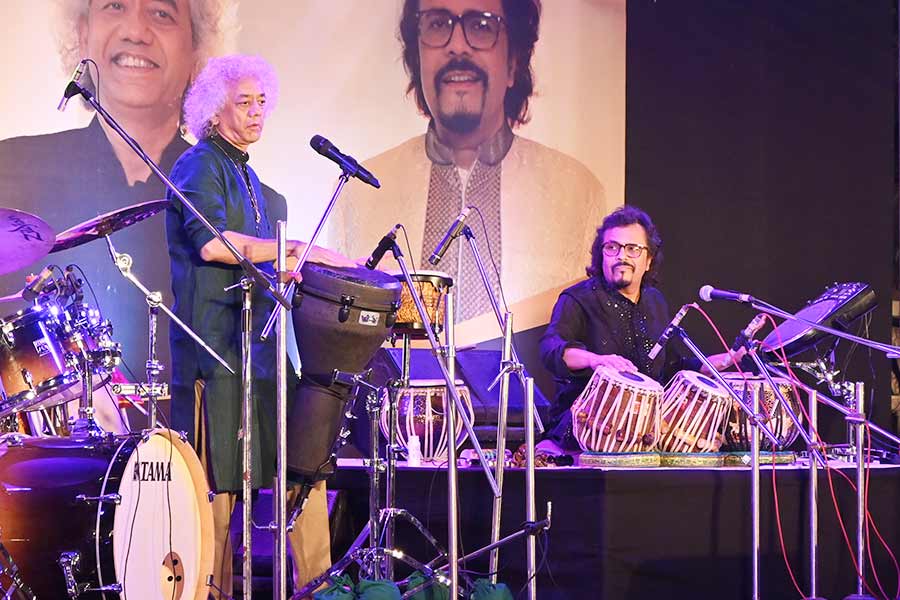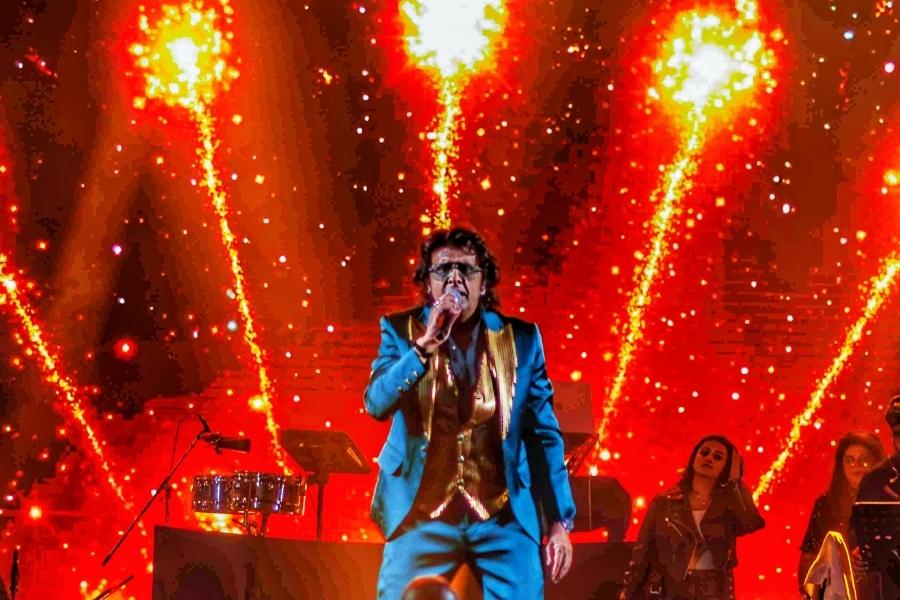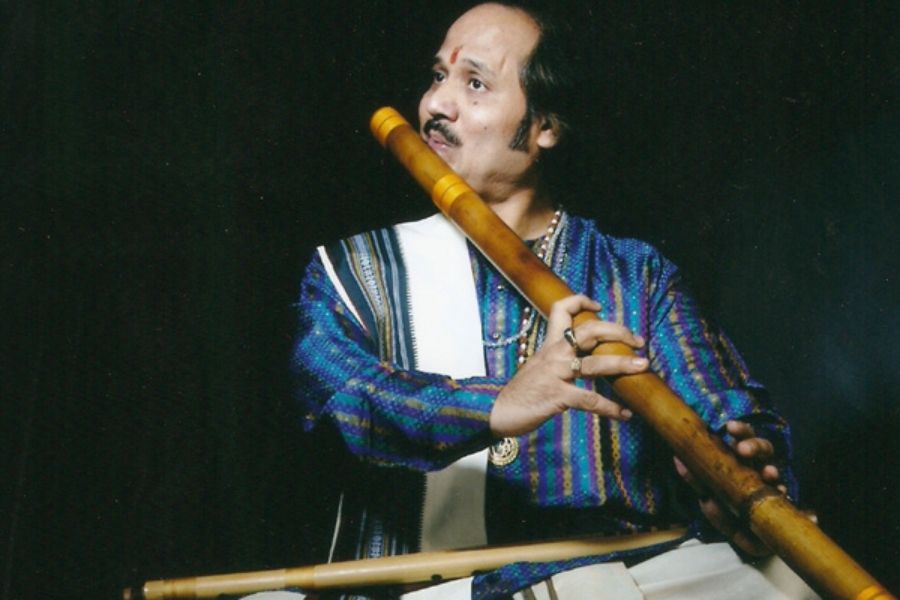The Tollygunge Club Main Lawn was packed on Sunday, on February 9, as Indian classical musicians Bickram Ghosh and Taufiq Qureshi took centre stage for an evening of classical music, curated by the Kolkata Centre for Creativity. While the duo have performed live together many times, this night was extra special as it also marked the launch of their first collaborative album, RamTa.
The album explores different musical flows based on various ragas — and the audience was the first to experience it live. While the duo took the spotlight, they were perfectly supported by Abhishek Mallick on the sitar, John Paul on the guitar and Anay Gadgil on the keyboard.
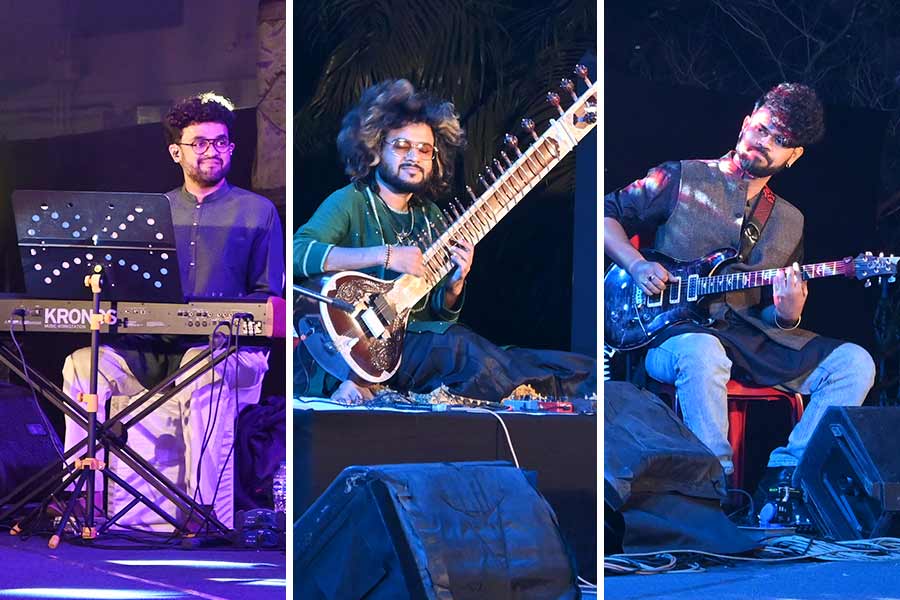
While the duo shone in the spotlight, they were supported by Anay Gadgil on keyboard, Abhishek Mallick on sitar and John Paul on guitar
The performance began with the song, Traveller, set to Raag Charukeshi. Before playing, the artistes shared an interesting detail — the song was created just three days earlier, and they had rehearsed it for only 10 minutes before presenting it to the audience.
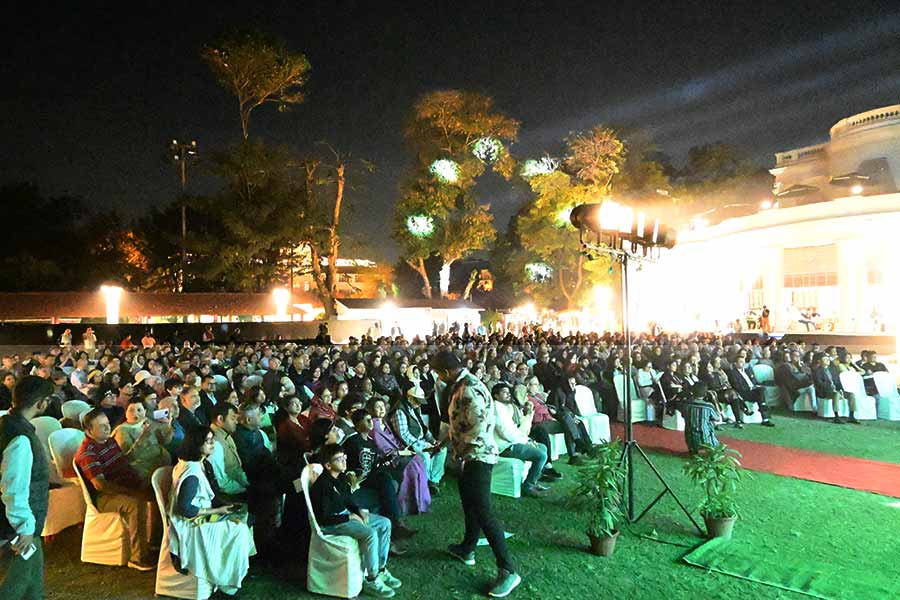
The night of classical music brilliance left the audience spellbound
The duo presented two more songs and the audience particularly loved the soothing notes of Raindrops on the Sun. Both musicians switched between different instruments, but it was especially fascinating to watch Taufiq Qureshi effortlessly move between the djembe and the modern drum set.
The guests witnessed true musical brilliance as the duo engaged in a jugalbandi through musical intonations — creating a unique exchange. Before they took the stage, Ghosh and Qureshi had a chat with My Kolkata about their creative journey.
Edited excerpts from the conversation follow.
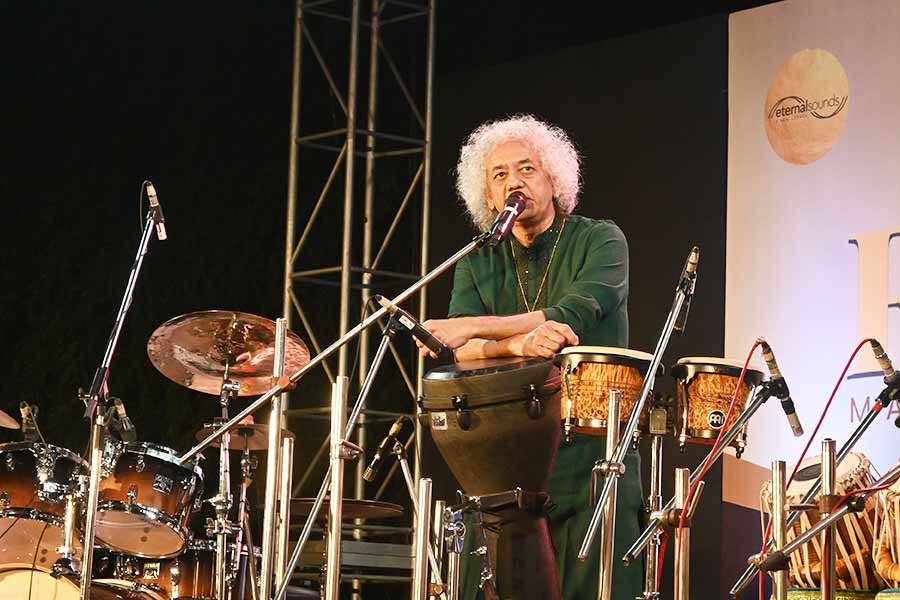
‘It was the perfect time to collaborate, and I’ve truly enjoyed our sessions. I’m incredibly excited for the album’s launch,’ said Taufiq
My Kolkata: This is your first time collaborating, right? How has the journey been so far? And why is the album called RamTa?
Taufiq Qureshi (TQ): Yes, RamTa comes from Bickram and Taufiq so ‘Ram’ is from his name and ‘Ta’ from mine. It’s been an amazing experience for me to work with him. I have a lot of respect for him. I love his music. We’ve been watching each other perform for decades, so this felt like the right time to collaborate. I’ve really enjoyed our sessions, and I’m very excited about the album’s release.
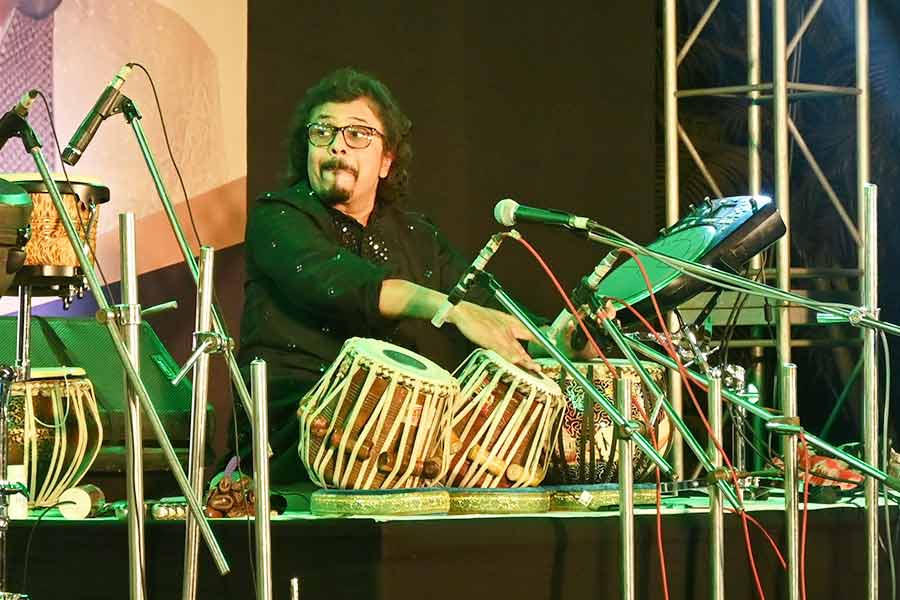
Bickram Ghosh shared insights into the creative process behind making ‘RamTa’
How does a collaboration like this work? How do you prepare for each song? When composing together, do you follow a specific process or does it evolve with each track, especially for this album?
Bickram Ghosh (BG): We just went straight into the studio. It all started in Kolkata, at my studio. Taufiq bhai was there, tapping on a frame drum, and he said, “I think this is a nice groove”. So, I started improvising on it. Then we decided to record it right away. That groove became our first template, and we built on it from there.
Taufiq has a thousand ideas, and I have my own thousand ideas, but what made this special was how smoothly everything came together. I’ve worked with others where creative clashes happen, but here, not even for a second did that happen. Everything just flowed naturally. We completed most of the first track in about three-quarters of a day. Then, over two of Taufiq’s trips to Kolkata, we worked on three more tracks. Later, I went to Mumbai, where we recorded the Legium drums — huge, powerful drums that he specialises in. The rest of the album was completed in Kolkata.
We also recorded two live tracks, jamming and shooting the video together. One of them had a unique nine-beat rhythm cycle called matta, which is also a taal (Matta taal). It was pure improvisation, but it turned out beautifully. Our live chemistry has always been strong, having performed together before, but capturing that in a recording was something special.
Throughout the process, we also spent a lot of time together — talking, discussing and connecting. That personal bond really helps shape an album. I’ve come to admire and respect him even more. He’s not just an amazing musician but also a wonderful human being. His knowledge of music is vast, yet he remains open-minded and boundaryless in his approach.
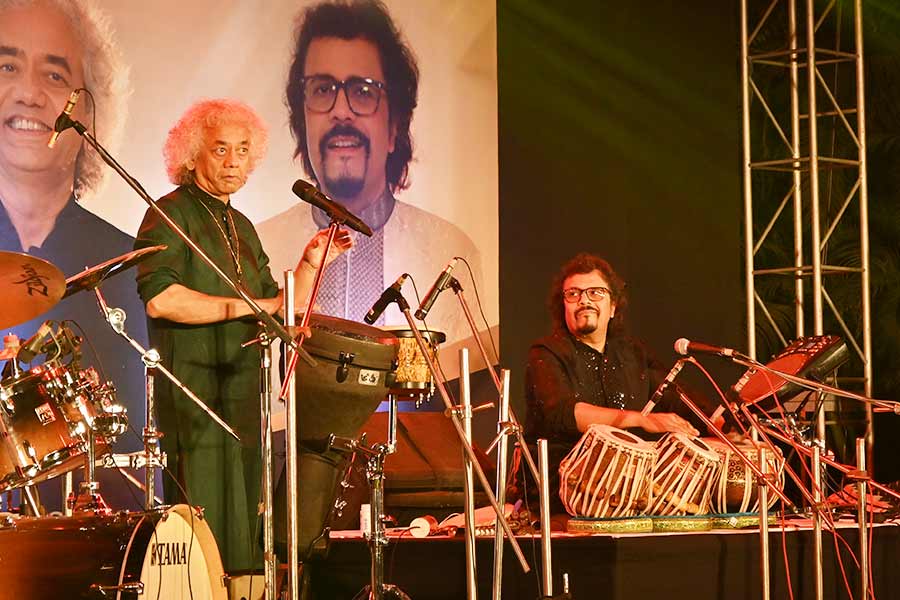
After an eventful journey of creating their first album, the duo look forward to crafting more musical symphonies together
After such an eventful experience making this album, do you see yourselves collaborating again soon?
TQ: Inshallah, Inshallah, very soon. Let’s see how RamTa does, and maybe we’ll come up with something new.
BG: Taram (both giggle).
TQ: Or, Staram (laugh out loud).
What message would you like to share with young musicians who want to pursue classical music as a career?
TQ: Don’t be afraid of classical music! Many people think, ‘Classical music? How can I do it?’ But it’s actually quite simple. No matter what genre you choose — classical, jazz or anything else—the most important thing is dedicated riyaz, which means regular practice. You must keep at it throughout your life. My biggest advice to students is: always remain a student. Never consider yourself a master.
BG: Keep learning, keep practicing and keep evolving. If you stop, you become stagnant — just like water, which needs to keep flowing.
TQ: Yes, you have to keep evolving.
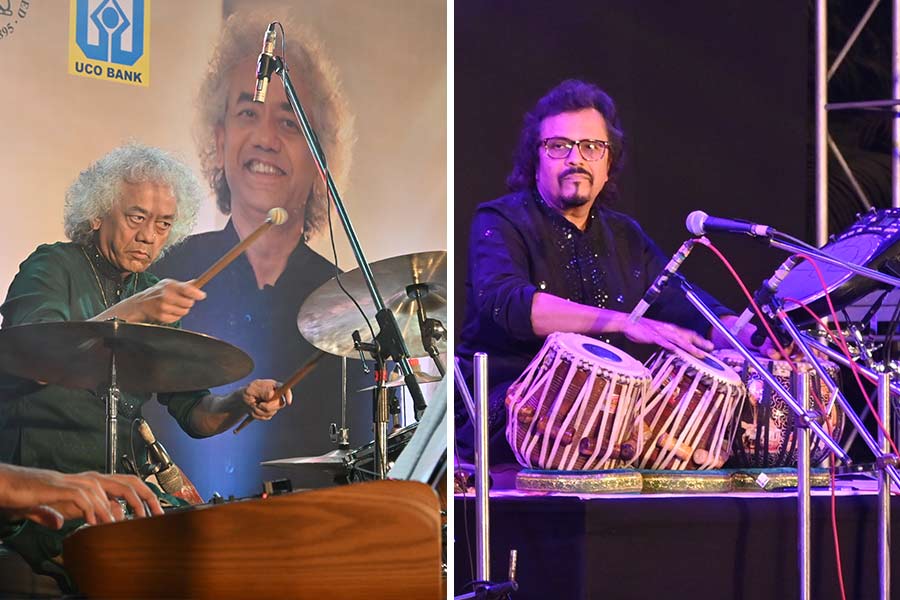
'Riyaz' is essential for every musician, emphasised the two musicians
Since you both spoke about riyaz, how often do you practice individually?
TQ: I do my riyaz mostly at night. I usually start around 10.30 - 11pm or sometimes even 11.30pm and I practice until 2-2.30am. Not every day, but at least three to four times a week. Luckily, I have very understanding neighbours who don’t complain (laughs).
BG: I’m a morning person, so I wake up around 6 or 6.15am. I sit down for riyaz by 7am and practice for as long as I can, depending on the day. Like Taufiq, I also do my riyaz about three to four times a week. But at this point, riyaz is just part of my daily routine — eat, play, practice, spend time with my kids and repeat. Practice is always an ongoing process.
TQ: Riyaz toh chalte rehta hai. Practice never stops.
BG: And even when we’re not actively playing, we’re always thinking about music — probably 90 per cent of the time.
TQ: Well, we have nothing else to think about… because we’re both married (both burst into laughter).
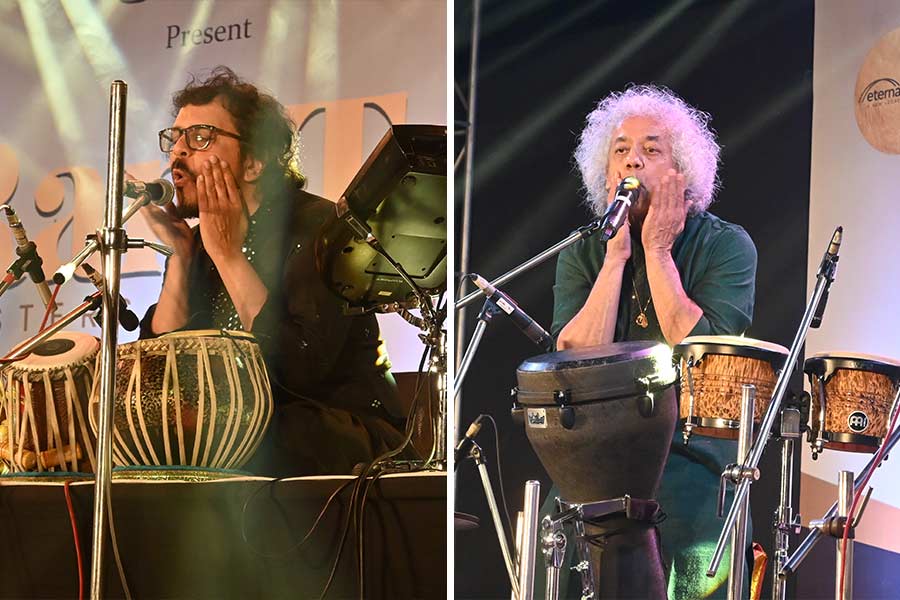
Both artistes highlighted Dum as the standout track from their latest album for its unique approach
Any specific track from the album RamTa that listeners should pay special attention to? You can each pick one.
BG: I think Dum.
TQ: Same, Dum.
BG: Dum is an a cappella piece with no instruments — just our voices and body percussion. That’s all there is. It’s a pure vocal and rhythmic experience, which is quite rare in India, making it something truly worth listening to.
